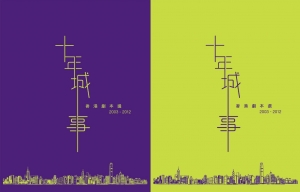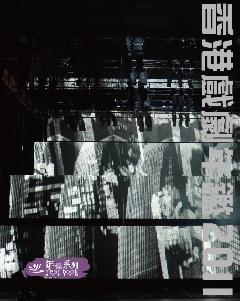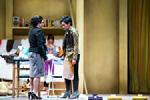The Chinese title, which translates literally into "Cambrian and Whisky", symbolizes the explosive evolution of lives and phenomena in the current era. Amid this rapid flourish, which is, as playwright Wong Wing Sze explains, comparable to the vigorous growth of creatures and plants in the Cambrian period, the lone individual drowns his misery with a bottle of whisky. Much is touted on how the play resonate the voice of the post-70s, a relatively neglected generation as much attention has been focused on the post-80s. Cambrian has done well to portray the lost and lonely souls of any age and generation who lead an ordinary and somewhat insignificant life in the multitude.
The title may have caught the interest of those who know of Faye Wong, a famous pop singer popular in Hong Kong in the 90s, who has a song entitled Cambrian. Eason Chan’s song adds further to the Hong Kong touch. The interior of a tong lau as the main backdrop, and the preoccupation with food (the cat’s name is Milk-tea, and Uncle Old complained that the chicken totally lacked in taste) make Cambrian very much a Hong Kong story and production. In addition, the fire dragon dance, which made a novelty appearance on the drama stage, and which, in this year’s Mid-Autumn Festival, raised publicity on its shortage of sponsorship for the annual performance in Tai Hang, reminds us once again how we have foregone traditions and destroyed heritage in our pursuit for economic growth.
There are many parallels in the characters. Kate’s mother and the neighbour, who both bear children out of wedlock, Wai Wai and Kate, who are both divorced, Sophie and Ken, who are outcast in their family and school, and Uncle Old and Master Twelfth, both immigrants from China but one to two generations apart. Most of the characters are stock characters. While all of them delivered funny or clever lines, and together, enlivened the show and provided much entertainment, I wonder if the characters are increased so there are enough of them for the costume party scene.
Cambrian presents some of the social concerns in Hong Kong. Uncle Old, immobile and in a state of dementia, lives all alone. Sophie is addicted to drugs. Kate, Sophie and Wai Wai have a problematic relationship with family or spouse. Kate has an affair with a married man. Wing Yee is single and pregnant. It isn’t the intention of the play to dwell into any of these concerns, so there is no clear explanation on whether the characters consciously made the choice they did. These events provided some sense of reality outside of the ghosts and spirits and mediums. Last but not least, the physical environmental problem is projected in the drama with a humorous touch by the reclaiming and re-distribution of things thrown away, and the re-cycling of human waste.
The mixed feeling of colonialism and post-colonialism come across well in the drama. Big Head would not rest until he heard that the British had gone. Wai Wai dressed up as Thatcher. Kate had married a British husband. Kate’s father appeared in her dream as a British. These seem to suggest nostalgia for the colonized days. Kate has tried “raping” Master Twelfth, and has corrected his pronunciation of Cantonese words. These could hint at the natives asserting their authority or imperialism on their motherland. Both Kate and Master Twelfth become good friends, which obviously signifies that both the people of Hong Kong and Mainland China integrate under one country, two systems.
Another symbolic notion is the fragility of the human body, and extending the notion further, how we will ignore other bodies when we are preoccupied with our own worries and problems. Uncle Old was unable to move. All that was left of Mother from the horrible road accident was a leg. There’s Big Head with just the head. The audience sympathizes with Sophia on hearing her family life at her funeral. Kate’s mother told her story when she was a ghost. Even for the characters with a wholesome body, there is a loss of self, an inability to exert one’s existence in the world, and no one hears when one speaks. Even if one is heard, as Wai Wai retorted, “I am keeping quiet, but that does not mean I agree with you.” The students in class are engrossed with their iPads, as recounted by Ken. But Ken also remembers how a teacher changed his life and inspired him to become a teacher. Our body could perish, but when we are able, we should seek others out, talk to them, and listen to them. As Kate’s mother lamented, she had hoped that Kate could understand her better when she became a mother in future, but the former had not lived to see the day.
The lack of depth in the characterization is a very minor shortcoming. All in all, Our Best of Youth in Cambrian should be applauded for a thoughtful and entertaining script, good performance by the cast, interesting stage design and delightful music and dance accompaniment. Its optimistic happy ending is realistic, in my opinion. After all, Kate was simply going through an emotionally trying period. Our society increases in affluence gradually or rapidly. The best of youth, and the best of any age, is, yet to come.
本網站內一切內容之版權均屬國際演藝評論家協會(香港分會)及原作者所有,未經本會及/或原作者書面同意,不得轉載。









